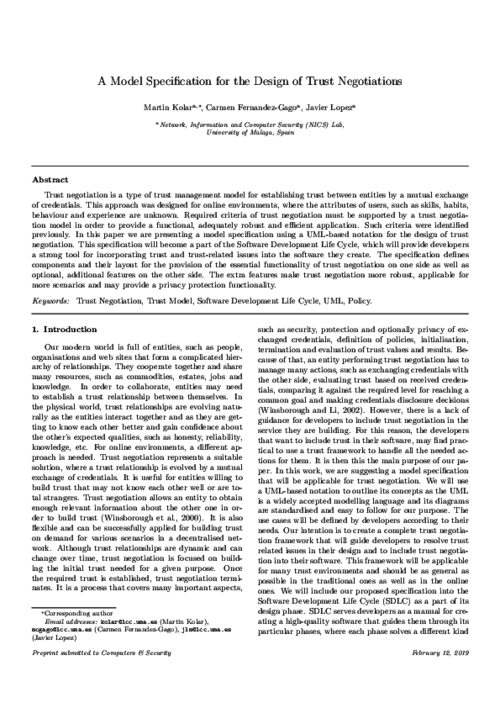 ] Year
] Year Security and Privacy in Mobile and Wireless Networking, S. Gritzalis, T. Karygiannis, and C. Skianis Eds., Troubador Publishing Ltd, pp. 105-128, 2009.
Abstract
The concept of trust has become very relevant in the late years as a consequence of the growth of fields such as internet transactions or electronic commerce. In general, trust has become of paramount importance for any kind of distributed networks, such as wireless sensor networks (WSN in the following). In this chapter of the book, we try to give a general overview of the state of the art on trust management systems for WSN and also try to identify the main features of the architectures of these trust management systems.
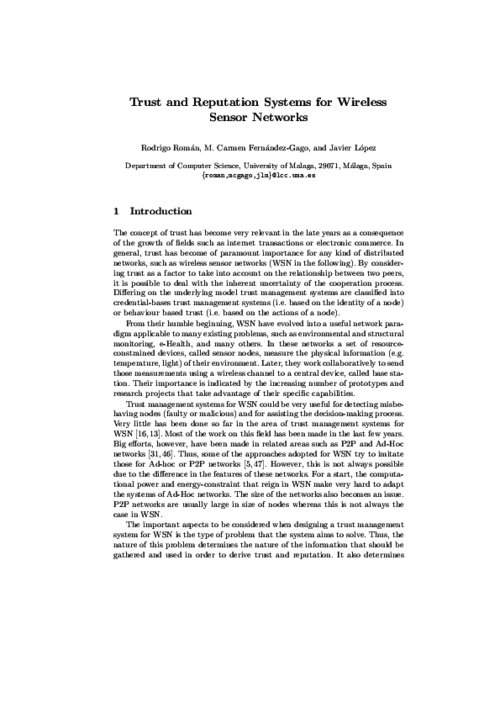
9th International Conference on Trust, Privacy & Security in Digital Business (TrustBus 2012), S. Fischer-Hübner, S. Katsikas, and G. Quirchmayr Eds., LNCS 7449, Springer Verlag, pp. 93-104, Sep 2012. DOI
Abstract
During the last twenty years, a huge amount of trust and reputation models have been proposed, each of them with their own particularities and targeting different domains. While much effort has been made in defining ever-increasing complex models, little attention has been paid to abstract away the particularities of these models into a common set of easily understandable concepts. We propose a conceptual framework for computational trust models that will be used for analyzing their features and for comparing heterogeneous and relevant trust models.
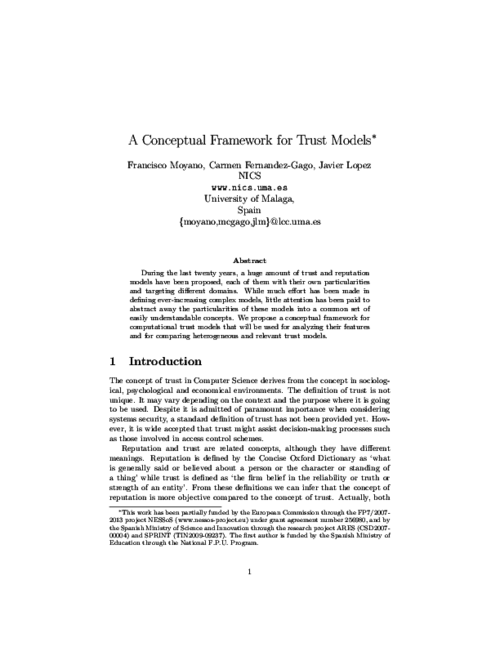
The 14th International Conference on Network and System Security (NSS 2020), vol. 12570, Springer, pp. 327-341, 11/2020.
Abstract
Trust negotiation represents a suitable approach for building trust in online environments, where the interacting entities are anonymous. It covers important criteria on security and privacy. In this work, we propose a method for implementing our model specification that handles trust negotiation. We define the structure of the trust negotiation module that is a standalone unit capable of negotiating on its own. It may be included to any software by its defined interfaces. We realise our method with a ride-sharing scenario and four trust negotiation strategies that we apply in order to validate our design and implementation. We propose a solution that is fully customisable based on different requirements. The proposal provides guidelines for developers in the process of including trust negotiation into their software.
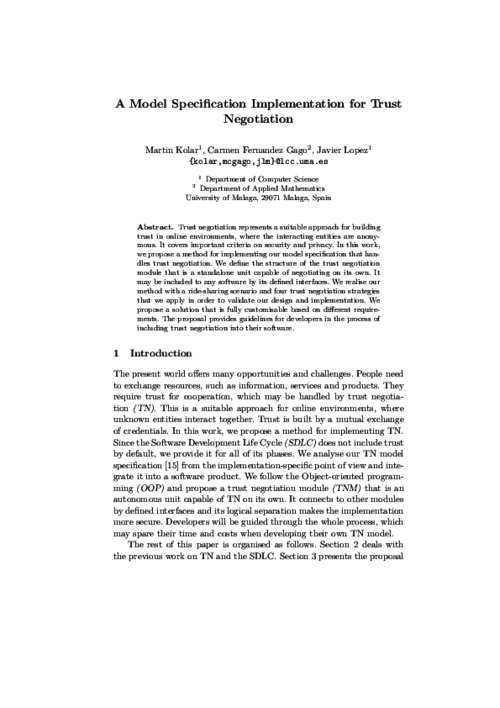
32nd Annual IFIP WG 11.3 Conference on Data and Applications Security and Privacy XXXII, 2018, vol. 10980, Springer, Cham, pp. 69-84, 07/2018. DOI
Abstract
Entities, such as people, companies, institutions, authorities and web sites live and exist in a conjoined world. In order to live and enjoy social benefits, entities need to share knowledge, resources and to cooperate together. The cooperation brings with it many new challenges and problems, among which one is the problem of trust. This area is also important for the Computer Science. When unfamiliar entities wish to cooperate, they do not know what to expect nor whether they can trust each other. Trust negotiation solves this problem by sequential exchanging credentials between entities, which have decided to establish a trust relationship in order to reach a common goal. Entities specify their own policies that handle a disclosure of confidential information to maintain their security and privacy. Policies are defined by means of a policy language. This paper aims to identify the most suitable policy language for trust negotiation. To do so, policy languages are analysed against a set of criteria for trust negotiation that are first established.
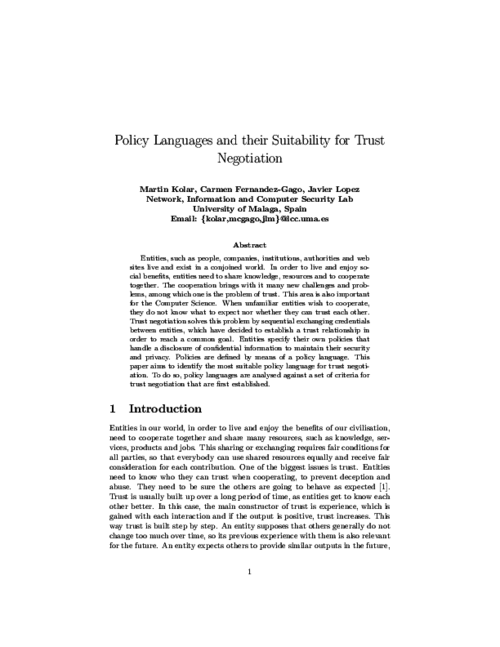
Proceedings of the Doctoral Symposium of the International Symposium on Engineering Secure Software and Systems (ESSoS-DS 2012), J. Cuellar, and N. Koch Eds., CEUR-WS 834, CEUR-WS, pp. 41-46, 2012.
Abstract
As the Future Internet arrives, more complex, service-based applications are spreading. These applications pose several challenges, including the huge amount of entities that must interact and their het- erogeneity. The success of these applications depends on the collaboration and communication of these entities, that might belong to different or- ganizations and administrative domains. Therefore, trust and reputation become two crucial issues. We propose the specification and design of a service-based security architecture that stresses the delivery of trust and reputation services to any application that might require them.
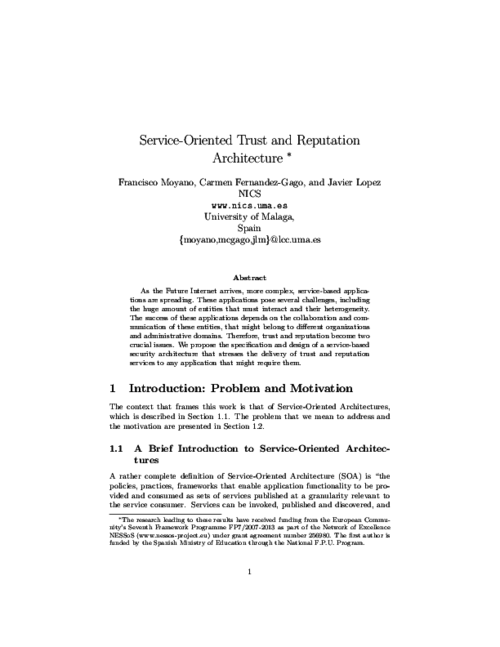
Computers & Security, vol. 84, issue July 2019, Elsevier, pp. 288-300, 04/2019. DOI
Abstract
Trust negotiation is a type of trust management model for establishing trust between entities by a mutual exchange of credentials. This approach was designed for online environments, where the attributes of users, such as skills, habits, behaviour and experience are unknown. Required criteria of trust negotiation must be supported by a trust negotiation model in order to provide a functional, adequately robust and efficient application. Such criteria were identified previously. In this paper we are presenting a model specification using a UML-based notation for the design of trust negotiation. This specification will become a part of the Software Development Life Cycle, which will provide developers a strong tool for incorporating trust and trust-related issues into the software they create. The specification defines components and their layout for the provision of the essential functionality of trust negotiation on one side as well as optional, additional features on the other side. The extra features make trust negotiation more robust, applicable for more scenarios and may provide a privacy protection functionality.
